We have been using sulfur to cure acne for generations… but what makes this element so effective?
Sulfur is the 16th element on the periodic table. Together with oxygen, carbon, hydrogen, and nitrogen, it is one of the five necessary elements for human existence.
Sulfur as a form of skin treatment dates back to the Egyptian era. Many studies have been done on this element since. Today, sulfur is used to prevent and treat various types of acne because of the way it interacts with our skin.
What is Sulfur and What Does it Do?
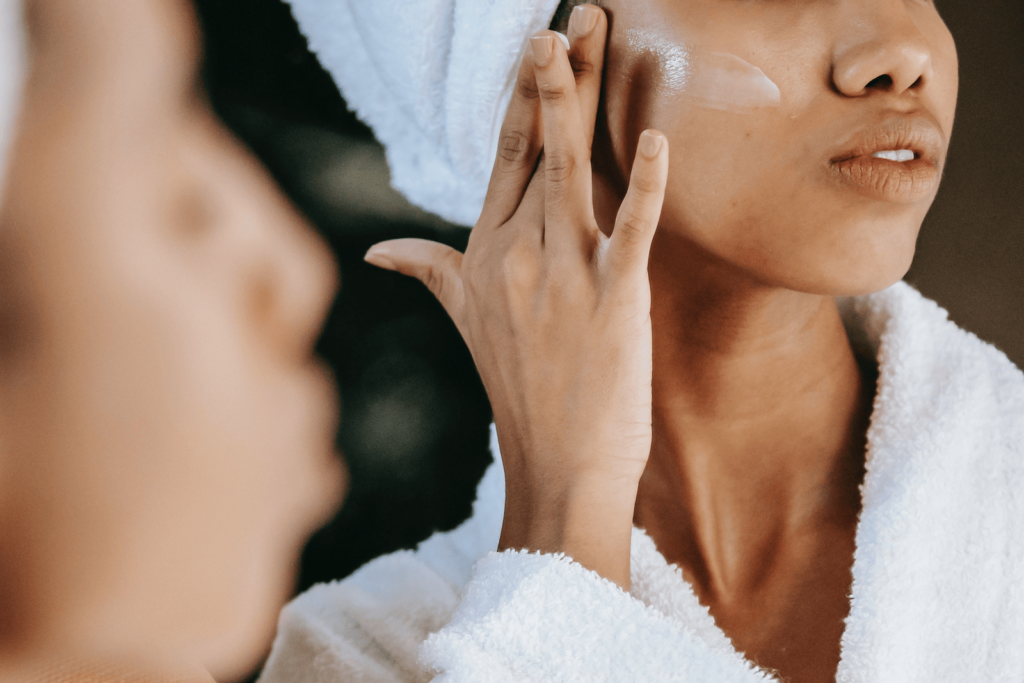
Sulfur occurs naturally as an element seen mostly in volcanic locations. You can find it in various minerals, such as iron pyrites, galena, gypsum, and Epsom salts.
Aside from being a component of inorganic compounds, matches, explosives, cement, and glass, it is also used in producing fertilizers and lead-acid batteries.
But wait, don’t panic! As long as it’s not used in toxic amounts, sulfur is not hazardous to humans.
Did you know that the average human adult has about 140 grams of this element in their body? In fact, it’s the seventh most abundant element by weight in the human body.
Now, stop worrying and continue reading! Sulfur might become your next skincare holy grail!
How Does Sulfur Work?
As a topical treatment for acne, sulfur works like benzoyl peroxide and salicylic acid. This natural cure helps dry up your skin’s surface and removes excess sebum that can lead to acne breakouts.
When used topically, sulfur is a gentle exfoliant that increases skin cell turnover. It lessens skin inflammation, helps with clogged pores, and prevents breakouts. Yes, it’s a clinically proven solution for acne and other skin problems.
Luckily, it’s easy to find in the market. Sulfur comes in various topical forms, including bar soaps, lotions, creams, and ointments.
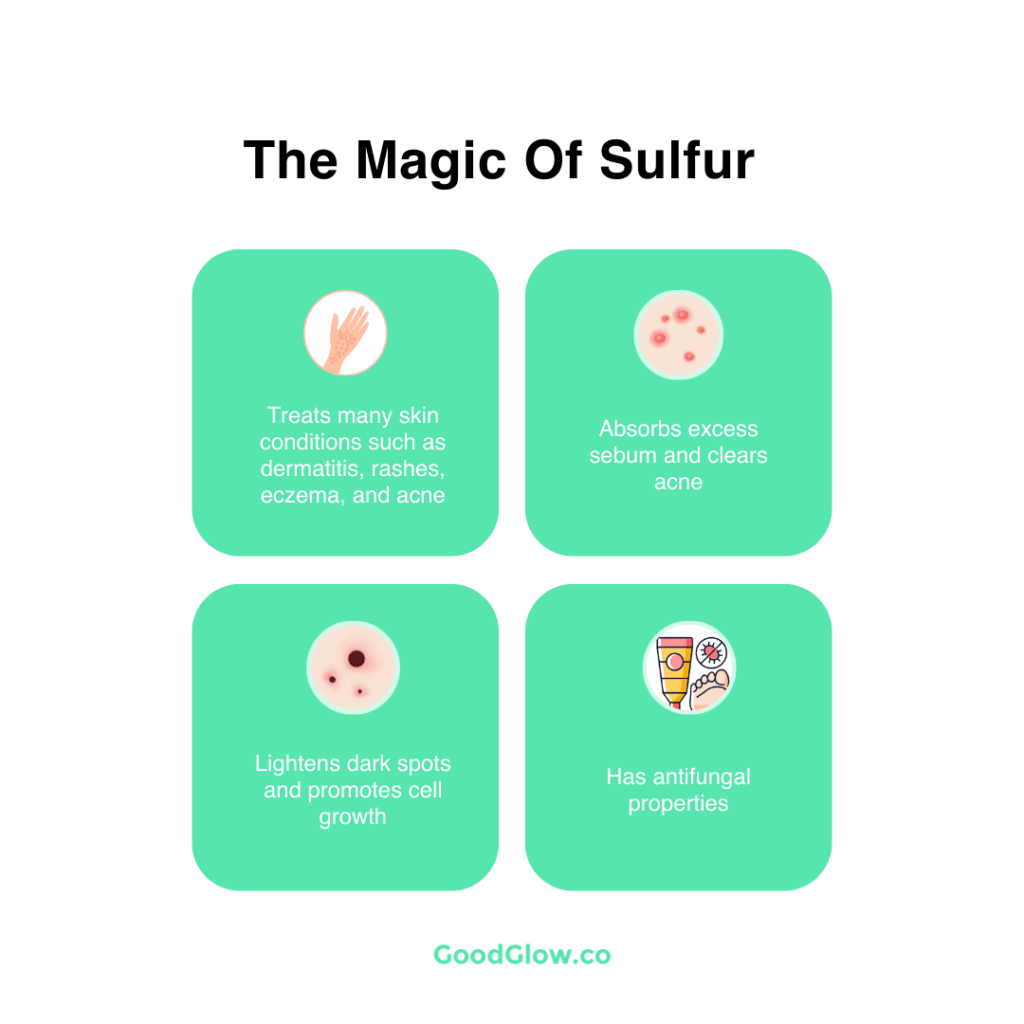
Can Sulfur Help Treat Acne?
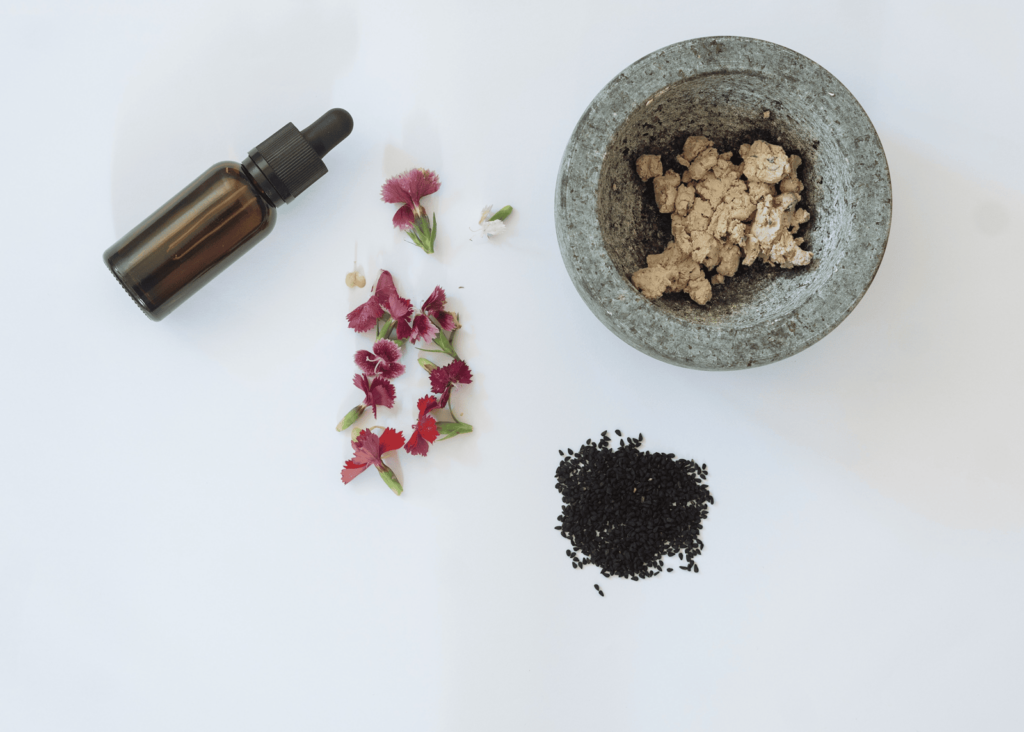
Anti-inflammatory and Antifungal
Sulfur is a popular ingredient in anti-acne regimens with its anti-inflammatory, antifungal, and oil-reducing properties. These properties help address the root causes of outbreaks and pimples.
Mild enough for even the most sensitive skin, it may be a viable alternative to more aggressive acne-fighting chemicals.
On its own, this element may not adequately treat acne. Still, when combined with other chemicals, such as salicylic acid or benzoyl peroxide, sulfur may work wonders for your skin’s appearance and feel.
Not an Overnight Solution
Remember that heavy use may cause your skin to become too dry and inflamed. This is especially noticeable when you use sulfur and retinoids, benzoyl peroxide, or salicylic acid. Ask your dermatologist how you can include sulfur in your skincare routine.
Patience is the key! Over-the-counter topical medicines might take 2 to 3 months of daily usage before you notice considerable effects.
What Kinds of Acne can Sulfur Treat?
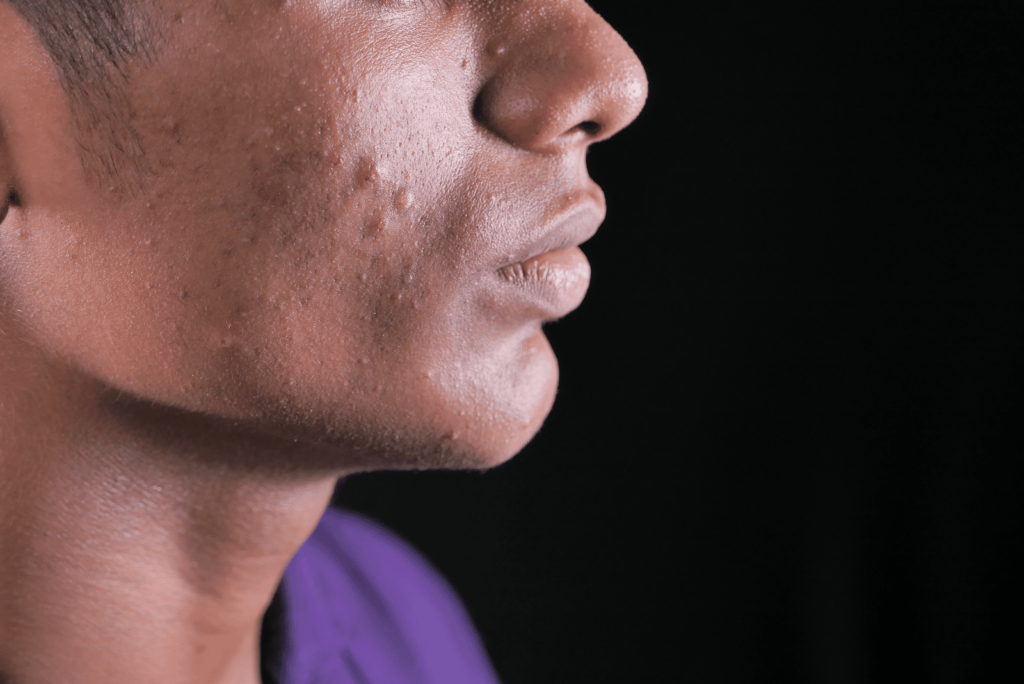
Sulfur is most effective for outbreaks caused by a mix of dead skin and excess oil.
Do note that there’s no one-size-fits-all cure for most skin conditions. Results may differ among people and situations.
Below is a short list of what sulfur can and cannot help with.
Whiteheads and Blackheads
A whitehead is a plugged pore that is closed at the surface. A blackhead is a clogged pore with an open top, which means it is easier to get rid of.
Whiteheads and blackheads, the least severe kinds of acne, are called non-inflammatory. They form when sebum and dead skin cells mix and become trapped in your hair follicles.
Because it targets dead skin cells and sebum, sulfur is an over-the-counter acne treatment that can deal with whiteheads and blackheads.
However, if you have sensitive skin, consider using sulfur instead.
Papules and Pustules
Acne with papules and pustules is typically moderate. A papule is a small, solid, or cystic, raised spot on the skin. A pustule is a papule that contains pus.
Both result when the walls of hair follicles collapse. The rupture causes skin inflammation and infection. The pores swell, become tender, and create discomfort.
For these lesions, sulfur may not be an effective therapy.
Nodules and Cysts
Inflammatory nodules and cysts characterize severe acne. These appear when your pores get clogged and infected, but not on the surface. They occur in the dermis layer, which is located beneath the epidermis. This makes treatment more challenging.
Because of the severity of nodules and cysts, this kind of acne cannot be treated at home. If you’ve tried benzoyl peroxide without success, sulfur is unlikely to help.
Fungal Acne VS Bacterial Acne

Different Causes
Fungal acne arises when a type of yeast called Malassezia enters the hair follicles. They spread and multiply, resulting in an acne-like rash on the skin.
Bacterial acne arises when there is an overgrowth of a bacterium called Cutibacterium acnes. Like fungal acne, pores and hair follicles become inflamed, causing a breakout.
Different Treatment
Bacterial acne can be treated with antibiotics and other topical products. Meanwhile, sulfur works well for fungal acne. A good diet and a healthy lifestyle will help with both conditions.
This highly informative eBook can help you understand more about acne to achieve clear skin.
Sulfur For Fungal Acne

Because sulfur is inherently antifungal, it can kill fungi or yeast on the skin. Along the way, it frees your clogged pores from those microorganisms!
You might see sulfur as an ingredient in certain products. They’re designed for short-contact use, such as cleansers, face pads, and masks.
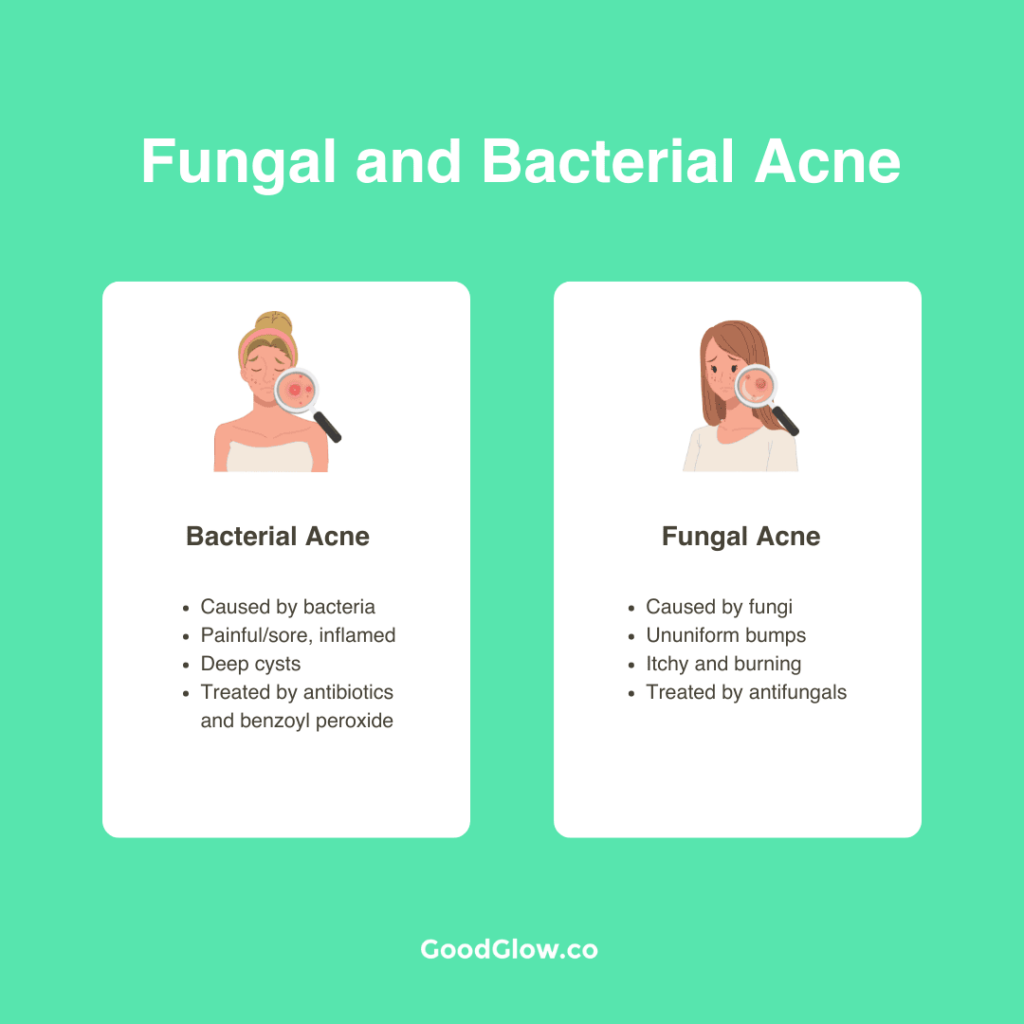
Can Sulfur Help Lighten Acne Scars?
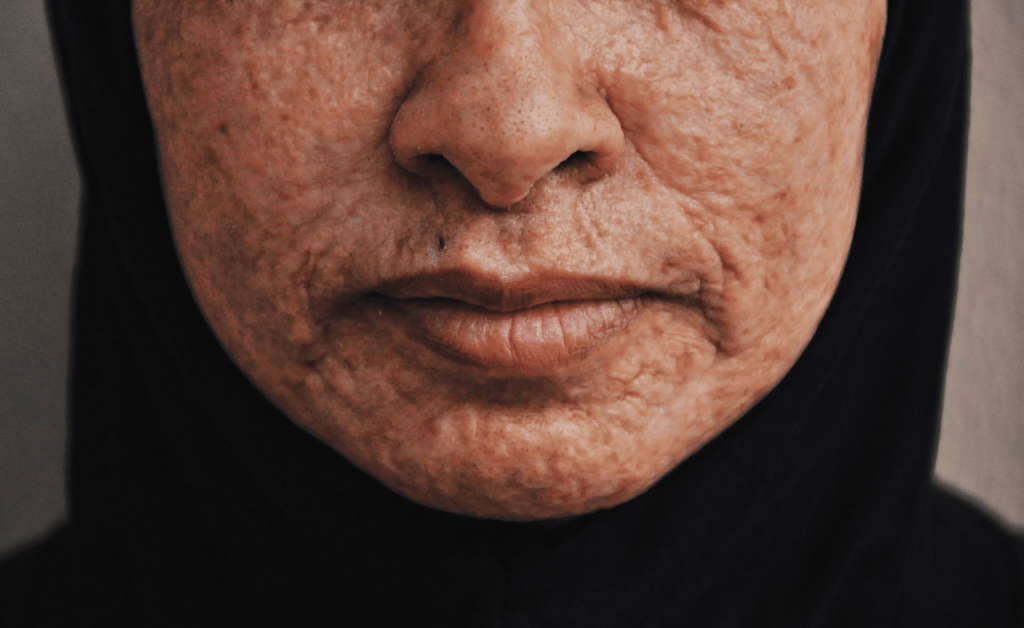
- By reducing discoloration and dark spots, sulfur balances out your skin tone.
- Effective for minor scars, this topical treatment speeds up cell turnover.
- This element lightens skin redness significantly.
Is Sulfur Safe on Skin?
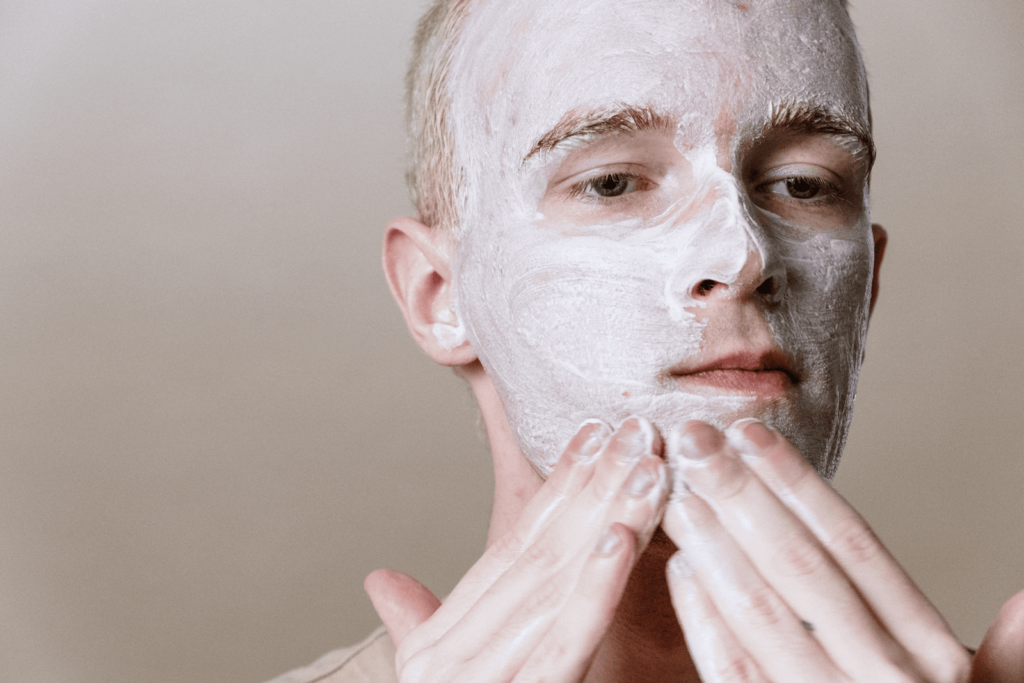
No matter how delicate, your skin is safe with the right amount of sulfur. When applied as a spot treatment, sulfur is a powerful element that can combat outbreaks in dry-to-combination skin types. But like other weapons against acne, it has the potential to cause irritation.
Although sulfur has a good safety profile for skincare, it should be highlighted that this only pertains to short-term use. Long-term use may result in severe dehydration and inflammation of the skin.
Consider also its scent. Unlike other skin-friendly products, sulfur may smell like “rotten eggs.”
Benefits of Sulfur for the Skin
- Dries out blemishes: It reduces sebum on the skin and dries up blemishes.
- Promotes exfoliation: This element has a keratolytic action mechanism, which softens and thins the skin. This action gets rid of dead skin cells, allowing new ones to thrive.
- Fights fungi: Sulfur has antifungal characteristics. It is a dermatological favorite because it destroys germs, fungi, and parasites.
- Treats skin conditions: Psoriasis and seborrheic dermatitis, including dandruff, may benefit from this natural treatment’s ability to soften and exfoliate thick, dead skin. It’s also effective against rosacea and seborrheic eczema.
Precautions While Using Sulfur on the Skin
Unless advised by your doctor, do not use any of the following products while using sulfur:
- Soaps or cleansers that are abrasive
- Products with alcohol
- Any additional topical acne treatment or peeling agent-containing product (for example, benzoyl peroxide, resorcinol, salicylic acid, or tretinoin)
- Cosmetics or soaps that may dry the skin
- Cosmetics with medicinal properties
Using sulfur with any treatments mentioned above on the same skin area may induce significant skin dehydration and irritation.
Sulfur and Pregnancy
Say goodbye to your worries because products containing alpha hydroxy acids (AHA) and sulfur are considered safe for pregnant women.
On the other hand, your usual acne treatments (like retinoids, salicylic acid, and benzoyl peroxide) should be avoided during pregnancy.
While most sulfur preparations are effective, pregnant women with a bionic sense of smell might be turned off by the products’ strong, unpleasant odor.
Alternatives to Sulfur
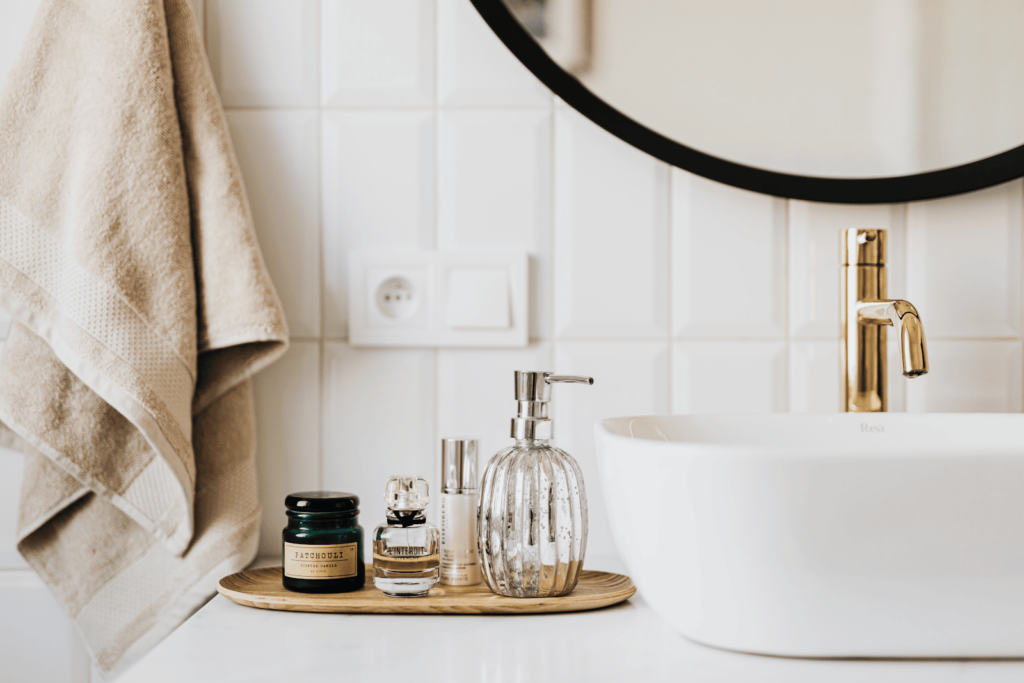
Benzoyl peroxide has been demonstrated to be effective on all kinds of acne lesions. As a killer of bacteria, it works fast!
Be mindful of the amount, though. If it can bleach fabric, it can cause peeling of your skin as well.
Salicylic acidis similar to benzoyl peroxide in its action, but it is gentler on the skin.
Like sulfur, these two increase the skin cell turnover time. They can also prevent acne breakouts by removing debris mixed with sebum on your skin. Learn more ways to get that glowing skin with this eBook.
Conclusion
Sulfur is a powerful anti-acne treatment that is clinically proven to be effective. You can use it to get rid of unwanted fungi clogging your pores. You can also use it to exfoliate your skin and eliminate excess oil. It’s mild enough for even the most delicate skin types.
For mild cases of acne, sulfur may be an appropriate treatment. For moderate to severe acne, combination treatments with sulfur-containing products and other medicines might be prescribed to become acne-free. Seek your doctor’s advice for proper diagnosis and treatment.
FAQs
A: An increased skin cell turnover rate is associated with a purging response. You may experience skin purging when using sulfur-containing products.
A: Sulfur alone may not be beneficial for cystic acne. It teams up with acne-fighting chemicals to work wonders. Consult with your trusted dermatologist for a prescription.
A: Like any other acne treatment, results may take up to 2 to 3 months of daily use.
A: Sulfur has shown what it can do. It’s a versatile element that you can use to treat several skin problems. These include scabies, rosacea, seborrheic dermatitis, and other non-infectious skin conditions. But your dermatologist will recommend the best management for you.
A: Yes. Pregnant and lactating women can safely use sulfur treatments and products.
Sources:
Armstrong, Gavin. “Smelling Sulfur – Nature Chemistry.” Nature, 22 Mar. 2012, www.nature.com/articles/nchem.1322.
How and when to use benzoyl peroxide. (2022, October 21). nhs.uk. https://www.nhs.uk/medicines/benzoyl-peroxide/how-and-when-to-use-benzoyl-peroxide/
Del Rosso, James Q. “The Use of Sodium Sulfacetamide 10%-Sulfur 5% Emollient Foam in the Treatment of Acne Vulgaris.” PubMed Central (PMC), www.ncbi.nlm.nih.gov/pmc/articles/PMC2923965. Accessed 12 Nov. 2022.
Keri, Jonette, and Michael Shiman. “An Update on the Management of Acne Vulgaris.” PubMed Central (PMC), 17 June 2009, www.ncbi.nlm.nih.gov/pmc/articles/PMC3047935.
Konaklieva, Monika I., and Balbina J. Plotkin. “Anti-inflammatory Sulfur-Containing Agents With Additional Modes of Action.” http://www.eurekaselect.com, www.eurekaselect.com/article/11094. Accessed 12 Nov. 2022.
Liu, Haibo, et al. “Topical Azelaic Acid, Salicylic Acid, Nicotinamide, Sulphur, Zinc and Fruit Acid (Alpha‐hydroxy Acid) for Acne.” PubMed Central (PMC), 1 May 2020, www.ncbi.nlm.nih.gov/pmc/articles/PMC7193765.
“Nonprescription Acne Treatment: Which Products Work Best?” Mayo Clinic, 21 July 2022, www.mayoclinic.org/diseases-conditions/acne/in-depth/acne-treatments/art-20045814.
Rzepecki, Rad. “Your Guide to Pregnancy Acne – Spring Street Dermatology.” Spring Street Dermatology, 21 June 2020, springstderm.com/your-guide-to-pregnancy-acne.
“Sulfur – Element Information, Properties and Uses | Periodic Table.” Sulfur – Element Information, Properties and Uses | Periodic Table, www.rsc.org/periodic-table/element/16/sulfur#:~:text=Sulfur%20occurs%20naturally%20as%20the,wells%20by%20the%20Frasch%20process. Accessed 12 Nov. 2022.
“Sulphur for Rosacea: Are We Reinventing the Wheel?” Journal of the American Academy of Dermatology, vol. 66, no. 4, 1 Apr. 2012, doi:10.1016/j.jaad.2011.11.146.
“Sulfur General Fact Sheet.” Sulfur General Fact Sheet, 1 May 2017, npic.orst.edu/factsheets/sulfurgen.html#:~:text=Sulfur%20is%20low%20in%20toxicity,to%20the%20skin%20and%20eyes.
“Sulfur in Skincare | Power of Sulfur.” PROVEN Skincare, www.provenskincare.com/skincare-ingredients/sulfur. Accessed 12 Nov. 2022.
“Sulfur.” Medicine LibreTexts. (1 Sept. 2018). med.libretexts.org/Courses/Dominican_University/DU_Bio_1550%3A_Nutrition_(LoPresto)_OLD/08%3A_Water_and_Minerals/8.3%3A_Major_Minerals/Sulfur.
Suva, Manoj. “A Brief Review on Acne Vulgaris: Pathogenesis, Diagnosis and Treatment.” Research & Reviews: Journal of Pharmacology, 4, 1-12. https://www.researchgate.net/publication/271072186_A_Brief_Review_on_Acne_Vulgaris_Pathogenesis_Diagnosis_and_Treatment. Accessed 20 Nov. 2022.
“SULFUR: Overview, Uses, Side Effects, Precautions, Interactions, Dosing and Reviews.” SULFUR: Overview, Uses, Side Effects, Precautions, Interactions, Dosing and Reviews, www.webmd.com/vitamins/ai/ingredientmono-1527/sulfur. Accessed 12 Nov. 2022.
Sydel, Simone. “What’s the Difference Between Fungal and Bacterial Acne? GoodGlow.” GoodGlow, 10 Mar. 2022, goodglow.co/fungal-vs-bacterial-acne.
Sydel, Simone. “10 Best Face Masks for Acne – GoodGlow.” GoodGlow, 21 July 2022, goodglow.co/best-face-masks-for-acne.
“The Use of Sulfur in Dermatology – PubMed.” PubMed, 1 Aug. 2004, pubmed.ncbi.nlm.nih.gov/15303787.
White, Mercedes. “Salicylic Acid for Face (Facial Salicylic Acid Peel)”. Minimally Invasive Aesthetic Procedures, 121-126. link.springer.com/chapter/10.1007/978-3-319-78265-2_18
Wood, Sam. “7 Best Natural Acne Treatments: What, Why, and My Choices – GoodGlow.” GoodGlow, 24 June 2021, goodglow.co/natural-acne-treatments.
Wood, Sam. “Whiteheads vs Blackheads.” GoodGlow, 1 October 2022, goodglow.co/whiteheads-vs-blackheads
Zaenglein, Andrea L., et al. “Guidelines of Care for the Management of Acne Vulgaris.” Journal of the American Academy of Dermatology, vol. 74, no. 5, May 2016, pp. 945–973., doi:10.1016/j.jaad.2015.12.037.

